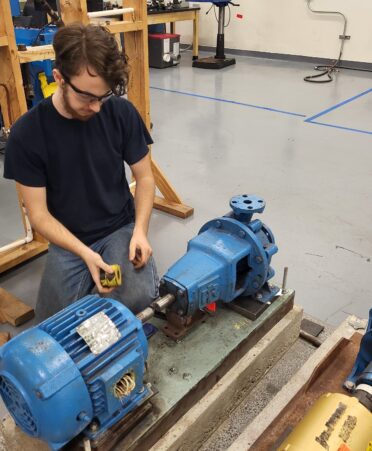(ROSENBERG, Texas) – “The Industrial Systems program used to be sold as a ‘jack-of-all-trades’ program. In reality, we are teaching people to be experts in all technical fields.”
So said Brian Weakley, lead instructor for the Industrial Systems program at Texas State Technical College’s Fort Bend County campus.
Weakley has been teaching the program for the past five years. During that time his goal has been to bring students up to the level of knowledge and skill that he would have looked for in employees while he was working in the industry.
Larry Jenkins, another instructor for the program on campus, agreed.
“I feel like most of what I do is teach people how to learn,” Jenkins said. “When you get out into a hands-on occupation like this, things are changing, and having the skill set to learn is a huge asset.”
Part of the appeal of earning a degree in the Industrial Systems program is having the ability to work along all aspects of a production or manufacturing line. The amount of skills learned means that students can have more freedom in where they end up working and what they end up working on.
“I would describe the program as if you followed any durable good from production to wherever it ultimately ends up, there is someone with this skill set working on it every step of the way,” Jenkins said. “Whether you are talking about wood, metal or crude oil, maintenance technicians are going to be there.”
Both Weakley and Jenkins find that by the third or fourth semester, most students already know where they are going to be working upon graduation. They attribute the high job placement to building relationships between the students and companies through TSTC’s employer spotlights and job fairs. The high demand for workers also plays a major role.
“We are giving students the opportunity to learn a large number of skills that companies are willing to pay large salaries for,” Weakley said. “The skills that they will be learning here will carry them through the rest of their careers.”
The program is structured around starting with the basics before working up to more advanced skills like troubleshooting. Each semester builds on the last to help students have a more full and well-rounded knowledge of the various systems that they will be working with and on. Just a few of the skills that students learn include fixing a plumbing problem or an air leak, troubleshooting a hydraulics system and programming a programmable logic controller.
Weakley jokes that he is surprised there is not an actual line outside the building of people waiting to sign up for the program.
“We have such great value for the money,” Weakley said. “By the time they leave the program, they are going to be professional maintenance technicians.”
Industrial machinery mechanics in Texas earn a yearly median salary of more than $58,000, according to onetonline.org. The website projected that the number of jobs for these mechanics in the state would increase 35% from 2020 to 2030.
TSTC’s Industrial Systems program offers associate degrees and certificates of completion in both electrical and mechanical specializations. The electrical specialization is taught at the Marshall and North Texas campuses, while the mechanical specialization is taught at the Abilene, East Williamson County, Fort Bend County and Waco campuses.
Industrial Systems is one of nine Money-Back Guarantee programs in which tuition is refunded if the participating graduate has not found employment in their field of study within six months of graduation. For more information about the guarantee, visit tstc.edu/mbg.
Registration for TSTC’s fall semester is underway. For more information, go to tstc.edu.
